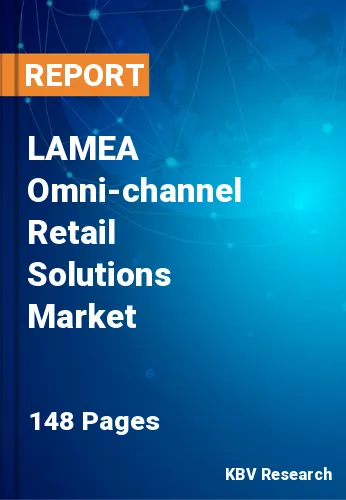The Latin America, Middle East and Africa Omni-channel Retail Solutions Market would witness market growth of 19.3% CAGR during the forecast period (2022-2028).
Business models evolve over time, sometimes as a consequence of market shifts and sometimes as a result of technological advancement, leading to the emergence of new, interesting trends. Technology becomes increasingly embedded into the daily lives of people as it evolves. The distinction between online and offline activities has begun to dissolve. As people's behaviours evolve, salespeople, marketers, and customer service representatives will need to adapt.
Instead of considering a desktop experience, a tablet experience, a smartphone experience, and an Apple Watch experience, businesses will need to develop a unified, omni-channel experience that customers can access whenever they desire. Omni channel retail solutions offer a number of benefits, including enhanced efficiency, decreased expenses, customer satisfaction, a higher happiness index, and continual growth in profitable revenue.
With the emergence of the digital economy, digitalization has transformed the retail environment by driving the expansion of the e-commerce sector. As a result, the consumer experience has gained increased momentum, with shopping convenience and mode gaining wider relevance. Due to the retail industry's rapid evolution, price, as well as product quality, are no longer the only factors consumers consider.
The retail industry in South Africa is well-established and expanding in neighbouring African states. As the country's economy began to recover from the effects of the COVID-19 outbreak, the Foreign Agricultural Service of the US Department of Agriculture estimated that retail food sales in South Africa would reach $40 billion in 2021, a 0.2% increase from 2020. After COVID-19 regulations were relaxed and in-store shopping costs increased, the expansion occurred. During the outbreak and instability in July 2021, the food retail industry in South Africa proved to be robust and resilient, and the country continues to act as the principal entry point for trade with other Southern African nations.
The Brazil market dominated the LAMEA Omni-channel Retail Solutions Market by Country in 2021; thereby, achieving a market value of $327.9 million by 2028. The Argentina market is registering a CAGR of 19.9% during (2022 - 2028). Additionally, The UAE market would showcase CAGR of 18.9% during (2022 - 2028).
Based on Component, the market is segmented into Solution and Service. Based on Solution Type, the market is segmented into Order Management, Warehouse/Inventory Management, CRM, Point of Sale, Promotion Planning, Analytics and Others. Based on Channel, the market is segmented into In-store Shopping, Online Home Delivery, In-store Pickup and Others. Based on End-Use, the market is segmented into Apparel & Footwear, FMCG, Consumer Electronics, Hospitality and Others. Based on Deployment, the market is segmented into On-premise and Cloud. Based on countries, the market is segmented into Brazil, Argentina, UAE, Saudi Arabia, South Africa, Nigeria, and Rest of LAMEA.
Free Valuable Insights: The Global Omni-channel Retail Solutions Market is Predict to reach $13.5 Billion by 2028, at a CAGR of 13.4%
The market research report covers the analysis of key stake holders of the market. Key companies profiled in the report include NCR Corporation, Diebold Nixdorf, Inc., Infosys Limited, Toshiba Corporation, Oracle Corporation, SAP SE, IBM Corporation, Cognizant Technology Solutions Corporation, Salesforce.com, Inc. and Infor, Inc. (Koch Industries).
By Component
By Channel
By End-Use
By Deployment
By Country
Our team of dedicated experts can provide you with attractive expansion opportunities for your business.

